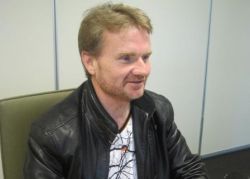
PayPal proved that a little imagination and a lot of out of the box thinking would take the world of transacting to a whole new level.
But did you know that one of the early supporters of PayPal is Australian, in fact lives locally?
PART ONE:
I have been fortunate enough to get to know Peter Davison over the past few years and have learned a lot from his experiences.
He shares his war stories with entrepreneurs around the world and this article is about one of these stories, specifically his nonconventional path to help building one of world's best known companies.
In this series we talk to Peter about his opinions and experiences in relation to working with entrepreneurs and innovation.
Peter says that he always wanted to be an entrepreneur, "I was always hassling people to get involved with business, even before university'. "To me being an entrepreneur meant making money, but it also meant self-creation and the opportunity to do things differently". But Peter never thought he would succeed, he laments that back in the late 1980's early 90's it was about who you knew and being a good networker.
"I didn't know what being a networker was. I was a mathematician who liked to read and do lots of study".
Peter says that it was the advent of the internet that allowed introverted, but creative people like him to access large global networks, "it really opened my mind to the things that I could do and be good at". He always wanted to create, make changes and do things better.
"I didn't care who it upset because I thought it was part of our role as the next generation to make change". A relevant message today as education and business leaders face the challenges of a rapidly changing work environment.
"When I started out", says Peter, "you had to speak the language of a particular business. This is changing now because people are seeking new ideas and are open to listening to 'nerdy' people like me".
There is a greater receptiveness to change and the value of young people's ideas and innovation. "We've seen enough to know that young people with ambition can change the world".
This is where Peter thinks his interest in Mathematics really helped him. "The thing about studying mathematics is you have some underlying connection to the truth. You have this self-belief that if you know the answer, then it doesn't matter what anyone else thinks".
Maybe this is why there is such again such a strong emphasis on the teaching of STEM (Science, Technology, Engineering and Mathematics) subjects again.
When asked about what lead him to PayPal, Peter says that he and his university friend were convinced they were going to make lots of money even though they both started out in entry level jobs which he describes as 'painful'. They both believed they had much more to contribute.
After working at Coca Cola and a small software company, Peter went back to university to help out a research institute at the University of Melbourne. He was successfully building software as a program manager, but knew it wasn't for him. Peter says that the 'structure of the work environment in Australia just didn't suit my personality'.
He needed much more creative freedom and the ability to create change without getting it approved first.
"My friend and I had this crazy idea 'why don't we set up a venture capital firm in Silicon Valley'", Peter says.
However, he didn't really know what venture capital was, he had never been to Silicon Valley and he wasn't that good at saving money so didn't know much about investing.
Peter proudly says "we had no network or experience with start-ups and here we were about to start a business".
In Part two of this story we talk to Peter about setting up a fund that supported a number of start-ups before PayPal. He again shares the highs and lows of his experiences working in Silicon Valley. We will later discuss the reasons he has returned to academia and his passion for educating and working with start-ups around the world.
 PART TWO:
PART TWO:
After deciding to set up a venture capital fund, Peter pretty much got on a plane to Silicon Valley to meet representatives of a company called Nullsoft. This company made a product called Winamp. Peter's approach to finding this company wasn't targeted, he says "I found them on the internet and thought let's see what we can do with this company".
It was a good thing that first impressions didn't count.
"I was expecting a large company, but I came to this address and its was just a suburban house" Peter goes on to say, '"I knock on the door in my venture capital suit and a guy answers the door half asleep and asks who am I".
That was Peter's introduction to Silicon Valley.
Peter says that Silicon Valley is like no other place in the world, 'you see kids become billionaires'. According to Peter the place is run by youth, he says "the youthfulness, the energy and vision is something that drives the place". Peter says it was so different to Australia, because it wasn't about how old you were, but rather your motivation and drive. In Australia, Peter says, it's more about 'earning your stripes'. Peter also thinks that Australia lacks success stories that come back and embed themselves in the ecosystem. When asked why this is important, Peter says it's because it acts as a motivator to others.
Peter doesn't think that Silicon Valley suits everyone, but he says it really suited his personality. He liked the environment because he believes that as more and more people break the mould and have great success, the big players start to question things. And this really appealed to him.
In the end Peter didn't do the deal with Nullsoft. He says, it was his friend's money and he had mentors in his ear telling him to rethink the offer. He listened to these mentors and Nullsoft was acquired by AOL a year later for around $80million. Peter laughs when he says "we realised that we must have been on to something, but we obviously missed out".
Our first big deal, says Peter was a company called Anonymizer. This was a small San Diego privacy company that helps protect your identity on the internet. Peter says this was somewhat out on the edge for venture capitalists, but they invested in it and helped to build it. The company was profitable from day one.
Peter is very proud of what they achieved with Anonymizer, because they helped build it. "We didn't take the venture capital route with it, we got in there at an early valuation and developed the company". Peter goes on to say that a company acquired Anonymizer at 10 times the initial valuation'.
After Anonymizer, Peter and his partner had an offer to be involved with mp3.com which eventually floated at $1billion in 1999. Peter says "that this was a level of craziness that even I didn't believe possible".
This then lead to an encounter that would change the lives of Peter and his business partner.
"By random chance", says Peter, "we met a service provider who was helping companies and he introduced us to a young Stanford guy, Kevin Hartz, who wanted to get into venture capital". Peter invited Kevin to join the company and help them look for suitable deals.
"Kevin introduced us to this chess champion friend of his from Stanford", says Peter. "This guy was a bit of an activist; he had never been an entrepreneur before but had a hedge fund and wanted to start his own company".
The guy's name was Peter Thiel.
Peter says the first meeting with Peter Thiel was great 'he believed that we knew what was going on in the internet space at the time'. Not many others did.
"At the time of our first meeting I didn't think he had such a great idea, it was a palm pilot virtual network", says Peter. But Peter did invest in the idea believing they could help guide him through the development side of the business. Peter says that Thiel was a great negotiator, "he was very different to other entrepreneurs, he thought this isn't my company, the company will belong to me and my investors". This attitude pretty much sealed the deal.
Peter suggested taking the technology and applying it to email and over the next little while the idea changed to a palm-pilot payment system. They discussed how eBay could be leveraged to help the reach and eventually the palm-pilot died and PayPal became a reality.
Peter says he was part of the PayPal story for about six years and he moved on after the company was acquired by eBay. Peter says, "it all felt very lucky to me and I knew that Peter Thiel would go on to be a heroic character, while some of those that worked behind him wouldn't".
In the final part of this story, we talk to Peter about his views on the role of education in entrepreneurship and some of the things he is doing now.
PART THREE:
 Peter spoke about the connection between education and business in the US and he says "I've seen people who don't have an academic background do incredibly clever things, but understanding the language of business and how it all works is an important part of the American education system".
Peter spoke about the connection between education and business in the US and he says "I've seen people who don't have an academic background do incredibly clever things, but understanding the language of business and how it all works is an important part of the American education system".
He goes on to say that people from an Ivy League University have a better chance of getting access to money. He recounts a meeting with an Australian start-up who wanted to go to the US and how they reacted to his suggestion that they might want to look for an Ivy League co-founder.
"They attract the investment – it's just the way it is", says Peter.
"In the US, if you want to create a billion dollar company, the next PayPal or Facebook, you are probably going to have to raise a lot of money. People who don't have University degrees do raise money, but the number is low in comparison to those that are University qualified".
Peter, who now spends a lot of his time working and studying in China, has observed that even in China, if you say you went to Stanford, you are pushed to the front on the queue, and there will be a number of investors waiting to speak to you. He believes it is starting to change, but Ivy League still has an appeal.
Peter came back to Australia after PayPal, and while Thiel put out a some feelers, Peter never took them up even though an obvious next step would have been for him to join a venture capital firm.
Instead, While back in Australia, Peter started making money on the internet "a nice authentic pursuit that appealed to me", he says.
When questioned about the role of universities in Australia, Peter thinks there is a role, but it has to change. "I think Universities are feeling the pressure to teach entrepreneurial learning, but in reality not everyone can be an entrepreneur. We still need accountants, lawyers and doctors. You need to start earlier and embed entrepreneurial potential in schools and follow that up in Universities to support anyone who wants to take that path".
Peter's view is that entrepreneurship can be learned, but it can't really be taught.
"You can't be taught the answers because sometimes there are many answers. It is about building your own internal compass." Peter compares it to being a parent, "it's something you learn on the job. You have to be dynamic and sometimes learn how to fly".
Peter says, "I learned by doing. I built online businesses from my bedroom in Canberra. I started outsourcing by learning how to say 'can you program in Pearl' in Russian, and I found teams in Russia and Siberia. I also built some online businesses to do with digital books and domain names and search engines. I was always looking for opportunities".
He often gets asked how to find money to fund new business ideas. Peter's advice is to find the people who are making money, make friends and learn from them. It's almost become a universal rule – learn from successful people and find out how they make their money. Peter believes that if you find successful people in your area of interest, you can work out shortcuts for yourself.
A short time after moving back to Australia, a mutual friend invited Peter to Sydney to check out the start-up scene there.
He says, "they were a bit sceptical of an old guy coming in but then I told them about PayPal and they didn't believe it". He goes on to say that they understood the value of a name. A group of smart people suggested he set up a co working space that's not for profit to support entrepreneurs. "The offer they made to me", says Peter was that "I could pay for it all. I still think it's probably the most sensible investment I ever made".
Peter says, he signed the lease, created the name Fishburners, got the original entrepreneurs in and paid for it all.
"When it became about me, I suggested they set up a board of entrepreneurs, and it hit a note within the community that it was actually all about them. They were able to inspire one another, without my involvement".
Peter sees these spaces as the on ramp to entrepreneurship. "In a co working space, you pay for your desk and it is what you make of it". Peter has a strong belief that knowledge is self-empowering. "If I meet a guy who is much richer than I am with all the success in the world, I look at how he thinks and want to understand better how he got there. It's an empowering position".
Peter is now completing a PhD in entrepreneurship and spends a great deal of his time in education, mentoring and supporting young start-ups around the world. But that isn't enough to keep Peter busy, he also is investigating a number of business opportunities in China.
Peter is very humble about his achievements.
He says that "some people who are much more experienced than I am meet me and because of my involvement with PayPal say, it's an honor to meet you and I think no its not, I mean I live in regional Australia". Well I know that every time I speak to Peter I learn something new and find him incredibly motivating.
About Lighthouse Business Innovation Centre
Lighthouse has a strong track record of supporting entrepreneurs, researchers and inventers on the path from concept to commercialisation. Since July 2008, Lighthouse has worked with over 990 distinct enterprises and provided group and peer based services to over 3400 enterprises and individuals. For over five years Lighthouse has successfully delivered business advice, education, mentorship and networking opportunities to help these businesses commercialise their ideas and grow their companies. Lighthouse also delivers programs such as the ACT Microcredit Program for the ACT Government. Visit www.lighthouseinnovation.com.au for more information.


